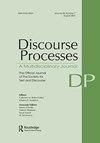阅读视角在眼动和理解中调节文本信念一致性效应
IF 2.1
2区 心理学
Q2 PSYCHOLOGY, EDUCATIONAL
引用次数: 0
摘要
读者通常优先处理和理解与特定意图相关的信息。通过重复测量研究,我们调查了读者的先验信念和外部阅读视角如何影响两个社会科学争议的信念相关文本的加工和理解。大学生在一个实验阶段从信念一致的角度阅读与信念相关的文本,在另一个实验阶段从信念不一致的角度阅读与信念相关的文本。用眼动追踪来衡量即时和延迟处理,用句子验证任务来衡量理解。结果显示,与信念一致的说法相比,信念不一致的说法的第一次阅读时间更长,尤其是在信念不一致的阅读角度。在信念一致的阅读视角下,对信念一致的观点的回顾时间更长,而在信念不一致的阅读视角下,两种观点的回顾时间相似。我们进一步发现,在信念一致的阅读视角下,学生对信念一致的信息有更好的理解,而在信念不一致的阅读视角下,学生的理解水平保持平衡。本文章由计算机程序翻译,如有差异,请以英文原文为准。
Reading perspectives moderate text-belief consistency effects in eye movements and comprehension
ABSTRACT Readers often prioritize processing and comprehension of information perceived as relevant to a particular intention. Using a repeated-measurement study, we investigated how readers’ prior beliefs and external reading perspectives influence processing and comprehension of belief-relevant texts on two socioscientific controversies. University students read belief-relevant texts from a belief-consistent perspective in one experimental session and from a belief-inconsistent reading perspective in another. Eye tracking was used to measure immediate and delayed processing and a sentence verification task was used to measure comprehension. Results revealed longer first-pass reading times for belief-inconsistent claims compared to belief-consistent claims, especially in the belief-inconsistent reading perspective. Longer lookbacks on belief-consistent claims were found in the belief-consistent reading perspective but similar lookback times for both types of claims in the belief-inconsistent reading perspective. We further found better comprehension for belief-consistent information in the belief-consistent reading perspective but balanced comprehension levels in the belief-inconsistent reading perspective.
求助全文
通过发布文献求助,成功后即可免费获取论文全文。
去求助
来源期刊

Discourse Processes
Multiple-
CiteScore
4.30
自引率
4.50%
发文量
27
期刊介绍:
Discourse Processes is a multidisciplinary journal providing a forum for cross-fertilization of ideas from diverse disciplines sharing a common interest in discourse--prose comprehension and recall, dialogue analysis, text grammar construction, computer simulation of natural language, cross-cultural comparisons of communicative competence, or related topics. The problems posed by multisentence contexts and the methods required to investigate them, although not always unique to discourse, are sufficiently distinct so as to require an organized mode of scientific interaction made possible through the journal.
 求助内容:
求助内容: 应助结果提醒方式:
应助结果提醒方式:


